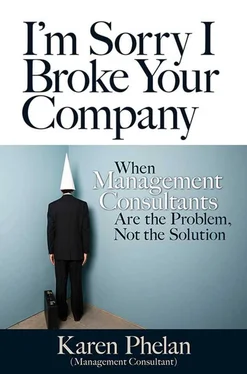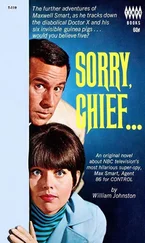Karen Phelan - I'm Sorry I broke Your Company
Здесь есть возможность читать онлайн «Karen Phelan - I'm Sorry I broke Your Company» весь текст электронной книги совершенно бесплатно (целиком полную версию без сокращений). В некоторых случаях можно слушать аудио, скачать через торрент в формате fb2 и присутствует краткое содержание. Город: San Francisco, Год выпуска: 2013, ISBN: 2013, Издательство: Berrett-Koehler Publishers, Жанр: management, popular_business, на английском языке. Описание произведения, (предисловие) а так же отзывы посетителей доступны на портале библиотеки ЛибКат.
- Название:I'm Sorry I broke Your Company
- Автор:
- Издательство:Berrett-Koehler Publishers
- Жанр:
- Год:2013
- Город:San Francisco
- ISBN:978-1-60994-740-8; 978-1-60994-741-5
- Рейтинг книги:3 / 5. Голосов: 1
-
Избранное:Добавить в избранное
- Отзывы:
-
Ваша оценка:
- 60
- 1
- 2
- 3
- 4
- 5
I'm Sorry I broke Your Company: краткое содержание, описание и аннотация
Предлагаем к чтению аннотацию, описание, краткое содержание или предисловие (зависит от того, что написал сам автор книги «I'm Sorry I broke Your Company»). Если вы не нашли необходимую информацию о книге — напишите в комментариях, мы постараемся отыскать её.
I'm Sorry I broke Your Company — читать онлайн бесплатно полную книгу (весь текст) целиком
Ниже представлен текст книги, разбитый по страницам. Система сохранения места последней прочитанной страницы, позволяет с удобством читать онлайн бесплатно книгу «I'm Sorry I broke Your Company», без необходимости каждый раз заново искать на чём Вы остановились. Поставьте закладку, и сможете в любой момент перейти на страницу, на которой закончили чтение.
Интервал:
Закладка:
Schoorman, David. «Escalation Bias in Performance Appraisals. nJournal of Applied Psychology 73, no. 1 (1988): 58–62.
Schwartz, Nelson D., and J. B. Silver-Greenberg. «Bank Officials Cited in Churn of Foreclosures.» New York Times. March 12,2012. http:// www.nytimes.com/2012/03/13/business/federal-report-cites-bank— officials-in-foreclosure-surge.html?_r=3&scp=l&sq=mortgage%20 foreclosure%20federal%20reportScst=cse.
Shweta. «Top Reasons for Poor Performance at Work.» CareerBright. Accessed April 14,2012. http://careerbright.com/career-self-help/top-reasons-for-poor-performance-at-work.
Smith, Jean Edward. Grant. New York: Touchstone, 2001.
Staples, Brent. «The Master of Monticello.» New York Times. March 23, 1997. http://www.nytimes.com/books/97/03/23reviews/970323.23staplet.html.
Stewart, Matthew. The Management Myth: Why the Experts Keep Getting It Wrong. New York: W. W. Norton, 2009.
Stocker, Gregg. «Avoiding the Corporate Death Spiral.» Speech given at CCPortugal, Sintra, Portugal, May 2009.
Tannenbaum, Robert, and Warren H. Schmidt. «How to Choose a Leadership Pattern.» Harvard Business Review 36 (March-April 1958): 95-101.
Taylor, Frederick Winslow. The Principles of Scientific Management. Project Gutenberg, 2002. First published 1911. http://www.gutenberg.org/files/6435/6435.txt.
Top Documentary Films. A Class Divided. Accessed April 14,2012. http://topdocumentaryfilms.com/a-class-divided/.
Ward, David, and Elena Rivani. «An Overview of Strategy Development Models and the Ward-Rivani Model.» Econ Papers Archive. June 7, 2005. http://129.3.20.41/econ-wp/get/papers/0506/0506002.pdf.
Wikipedia. «Albert Einstein.» Last modified July 29,2012. http:// en.wikipedia.org/wiki/Albert_Einstein.
«Jack Welch.» Last modified July 24,2012. http://en.wikipedia.org/wiki/Jack_Welch.
«Scientific Management.» Last modified May 20,2012. http://en.wikipedia.org/wiki/Scientific_management.
Acknowledgments
Mostly, I want to thank the people who have helped me bring this book to fruition. My main supporter and most reliable critic was my husband, Tom Hennigan, who gave me the best advice and also tolerated my moods. In that vein, I should also thank my children, Aidan and Alex, for putting up with my crankiness. Like some people discover they are mean drunks, I have discovered that I am a grumpy writer.
I’d like to thank Mark Hurwich for his eagerness to help me no matter what the endeavor and for his always spot-on critiques. Without him, this book would never have happened. I also want to thank Rich Catanese for his feedback and his encouragement. My business partners are also due some thanks: Peg MacBeth for her kind words of support and Dwight Ueda for putting up with my delayed deadlines while I worked on the manuscript. My friend Julie Ruth supplied me with wise and practical advice on more than one occasion and continues to be my best sounding board.
This book wouldn't be possible without the wonderful folks at Вerrett-Koehler. They provided me with a great community of resources and a supportive environment. Some of the people at В К and It's associates who were invaluable were Neal Maillet, Jeevan Sivasubramaniam, Michael Crowley, Katie Sheehan, Dianne Platner, Richard Wilson, Sharon Goldinger, and Beverly Butterfield. I apologize to anyone I may have inadvertently left out.
I'd also like to thank those reviewers that В К rounded up for all their helpful feedback, including Katherine Armstrong, Tora Estep, Pamela Gordon, and Wally Bock.
About the Author

Karen Phelan was born the daughter of poor, Southern sharecroppers and as a child educated herself by reading Pilgrims Progress by candlelight in her family's log cabin. Oops, that's totally not true. Karen's parents were middle-class, Irish immigrants who resided in a Cape Cod home on the outskirts of New York City. As a child, she strongly suspected that she was adopted. However, as a grown woman, she finds herself doing all the things her mother did that drove her crazy, and the shared gene pool has become evident. This turns out to be advantageous as the sheer amount of her Irish relatives could put this book on the best-seller list.
Karen suffered through twelve years of parochial school, but despite the good nuns' best efforts, they were not able to beat the sass out of her. However, they did successfully beat good grammar and spelling into her, which proved quite useful in later years. Afterward, Karen went to MIT, where she studied materials science and engineering and learned how to manipulate metals and ceramics at the atomic level. At MIT, she made the most important discovery of her career — she was, indeed, a nerd. As part of an MIT masters program (did she mention she went to MIT?), she worked in a military research facility in Los Angeles. While there, she did not get caught in a mantrap door or get her head stuck in the security gate like many of her colleagues, and thus she concluded that she wasn't cut out for government work. Instead, she decided to pursue a lifelong ambition to travel, so she joined the management consulting practice of Deloitte Haskins 8c Sells (now Deloitte & Touche). There she specialized in supply chain and manufacturing and traveled to all the glamorous hotbeds of American industry. Eventually, she joined Gemini Consulting, where she switched her career focus to process reengineering, change management, and training, but continued to travel to scenic manufacturing sites. She learned many useful lessons during this time, first and foremost that her college degrees had no practical applications outside her field. However, other lessons stayed with her for life, and to this day she knows her way around most US airports, the big hotel chains, and fast-food menus.
Seeking a more stable and settled lifestyle after starting a family, Karen joined Pfizer Consumer Healthcare. First, she managed a training group, but then she took on an international IT management role and found herself traveling again. (So much for settled!) While at Pfizer, she also worked on acquisitions and divestitures, including her own, when her division was bought by Johnson 8c Johnson. (So much for stability!) Next, she took an online marketing position at the J&J division that was later investigated by the FDA. She realized she was poorly suited to marketing when she pondered daily why anyone would need so many personal care products or want to have a relationship with a brand.
In 2008, she left J&J to help start a US office for an Australian software company that was relying on venture capital for It's expansion. Several months later, the US financial crisis hit, funding was denied, and she decided that she didn't want to work for free. Now Karen has found her passion and is back working as a manageent consultant, this time as a cofounder of Operating Principals. Operating Principals is on a mission to help companies replace onerous human resource practices and systems with better dialogue, better relationships, and better employee job fit. It's operating principle is that simple acts often have the most profound results, and many workplaces are rife with needless complexity and bureaucracy.
Karen has been married to Tom Hennigan for twenty-two years and has learned that the secret to a long-lasting marriage is neither love nor commitment but rather inertia. She is mom to two teenage boys, Aidan and Alex, who currently wish they were adopted. (Sorry, boys!) They reside in an idyllic lake community in northern New Jersey (yes, New Jersey), nestled between Greenwood Lake and a state forest, living at one with nature. In other words, the bears regularly raid the trash, the raccoons have the run of the garage, and the chipmunks enjoy digging up the garden.
Читать дальшеИнтервал:
Закладка:
Похожие книги на «I'm Sorry I broke Your Company»
Представляем Вашему вниманию похожие книги на «I'm Sorry I broke Your Company» списком для выбора. Мы отобрали схожую по названию и смыслу литературу в надежде предоставить читателям больше вариантов отыскать новые, интересные, ещё непрочитанные произведения.
Обсуждение, отзывы о книге «I'm Sorry I broke Your Company» и просто собственные мнения читателей. Оставьте ваши комментарии, напишите, что Вы думаете о произведении, его смысле или главных героях. Укажите что конкретно понравилось, а что нет, и почему Вы так считаете.












